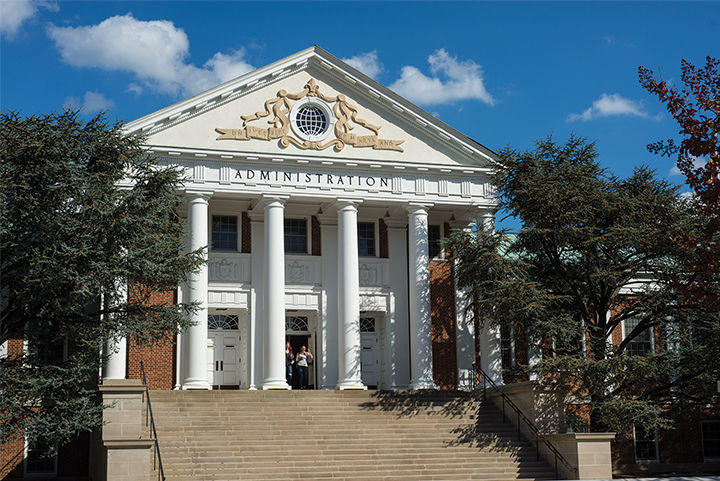Views expressed in opinion columns are the author’s own.
The past several months have not been a golden age for the public apology. The #MeToo movement has given dozens of terrible men the chance to humiliate themselves for audiences of millions. And during the past year at the University of Maryland, public apologies have flooded our inboxes and Twitter feeds. As an exercise in examining how university officials respond to student concerns, it’s useful to review the past year in apologies, from the passable to the dumbfounding to the atrocious.
It may be naive, but I actually believe these public apologies matter. High-level university officials often feel distant, so public acts of contrition are an opportunity for them to show some humility and communicate directly with students.
What’s more, a public apology also requires careful consideration and preparation. When an official bungles one, students can be fairly certain it wasn’t a momentary slip-up — the administration really is out-of-touch.
So let’s now take a chronological journey through three high-profile apologies, and see what we can learn about how this university interacts with its students.
#UMDNotAHome
In October, this university’s deputy general counsel, Diane Krejsa, engaged in some light snowflake bashing, explaining that if students want everybody to have the “same views on sexual orientation and transgender and whatever religion or whatever it is — they should stay at home.” Her clearly offensive comments set off the viral hashtag #UMDNotAHome, and necessitated two different apologies, one from university spokesperson Joel Seligman and one from Krejsa.
[Read more: Students call out admin with #UMDNotAHome after an official’s comments on hate symbol bans]
Both of these apologies were very bad. #UMDNotAHome took off because students were fed up with an administration that seemed callous to the safety concerns of vulnerable students. But Krejsa made her apology about herself, not the students who were frustrated and scared. By insisting she’s not privileged because her husband is Jewish and her parents worked hard to send her to Brown University, Krejsa only cemented the administration’s reputation as disconnected from student concerns.
Seligman’s apology on behalf of university administration was too defensive to be taken seriously. He made the silly claim that Krejsa’s comments were taken out of context and said the university regrets the “overwhelming misunderstanding.” It was the breed of non-apology common to communications professionals, wherein the official avoids actual contrition and blames its audience for taking offense in the first place.
Seligman’s statement avoided acknowledging the obvious reality: A university official said something dumb. That he couldn’t admit that revealed something deeply awry in the administration’s culture.
Resident Life’s mental health protocol
The Department of Resident life made student Faye Barrett temporarily homeless in April following her brief hospitalization for a panic attack. Barrett posted Resident Life’s letter requiring her to be evaluated by two university employees before returning to her apartment.
[Read more: UMD barred a student from returning to her on-campus apartment after a hospital stay]
In response to the subsequent social media furor, Resident Life Director Deborah Grandner wrote a letter to the campus community, announcing a new committee (there’s nothing more satisfying than a committee!) and pledging that, “We can and will do better.”
Grandner’s apology failed because she didn’t recognize why she was apologizing. Students were upset because Resident Life’s mental health protocol is cold and uncaring, and because Resident Life’s staff could possibly think sending the letter was wise. But Grandner defended Resident Life staff, as well as its policy, writing, “The protocol we have applied when residents are transported to the hospital due to mental-health related crises has been effective.”
So, if the protocol is effective and the staff are compassionate, it’s unclear what Resident Life was actually apologizing for. Grandner’s letter suggests Resident Life isn’t really listening.
Computer science TA handbook
And now, we reach one final apology, which came after a graduate student noted misogynistic language in the computer science department’s teaching assistant handbook. The document advised female TAs to be “patient” in the face of sexist behavior, and warned male TAs that female students may try to use the “male-female dynamic” for their academic advantage. It was gross, offensive and rightly taken down almost immediately after going viral.
I’m grading on a curve here, but I think the subsequent apology was actually acceptable. A letter by department chair Ming Lin and computer, mathematical and natural sciences college Dean Amitabh Varshney clearly stated the TA handbook was counter to the department’s values, admitted it should never have been posted and offered an opportunity for students to share concerns.
The authors also said they didn’t know the origin of its own TA handbook — which is bonkers. But that excuse, to me, is actually believable considering how embarrassing it is. If the department wanted to obfuscate, it could’ve come up with a better justification than that.
Part of a good apology is embracing the vulnerability and embarrassment that comes with screwing up. The computer science department, while obviously at fault for allowing the handbook to be published, owned up to its mistake admirably.
This university will inevitably make mistakes. It’s a massive bureaucracy that employs thousands of staff, all of whom are fallible human beings. Many of those mistakes will harm students, and students will rightly call them out. That’s natural.
But when they get called out, university officials have a choice. Will they get defensive, ignore students’ concerns and babble about themselves? Or will they listen, be contrite and make authentic attempts to improve? This year, the university too often chose the former option. Next year, they would be wise to choose the latter.
CORRECTION: Due to a columnist error, a previous version of this column misspelled Diane Krejsa’s name. This column has been updated.
Max Foley-Keene, opinion editor, is a sophomore government and politics major. He can be reached at opinionumdbk@gmail.com.



